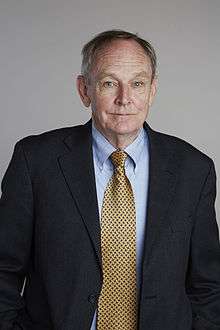William Hughes Miller
William Hughes Miller (born March 16, 1941, Kosciusko, Mississippi) is a professor at the University of California, Berkeley and a leading researcher in the field of theoretical chemistry.[3]
William Miller | |
|---|---|
 William Miller in 2015, portrait via the Royal Society | |
| Born | William Hughes Miller March 16, 1941[1] |
| Education |
|
| Spouse(s) | Margaret Ann Westbrook |
| Awards |
|
| Scientific career | |
| Fields | Theoretical chemistry |
| Institutions | University of California, Berkeley |
| Website | www |
Research and career
Miller is known for his development of semiclassical methods for treating chemical dynamics. From 1989 to 1993, he served as Chair of the Chemistry Department at the University of California, Berkeley, and since 1999 he has been the Kenneth S. Pitzer Distinguished Professor at UC Berkeley.[4][5]
Awards and honors
Miller was elected a Foreign Member of the Royal Society (ForMemRS) of London in 2015. His nomination reads:
Professor Miller's papers over the last 45 years have essentially defined the field of theoretical chemical dynamics. His seminal contributions include a comprehensive semi-classical theory of atomic and molecular collisions, an elegant theory of electronically non-adiabatic processes in which the nuclear and electronic motions are treated on an equal footing, a highly accurate semi-classical "instanton" theory of deep quantum tunnelling events, and the definitive exact quantum mechanical theory of chemical reaction rates. These fundamental developments are at the root of the agreement between theory and experiment that we are now accustomed to seeing in chemical reaction dynamics, and the basis of essentially all modern theoretical research in the area.[2]
Miller was the 2007 recipient of the Welch Award in Chemistry. He is also a member of the National Academy of Sciences and the International Academy of Quantum Molecular Science.[1]
References
- "Academy of Quantum Molecular Science biography of William Hughes Miller".
- "Professor William H Miller ForMemRS". London: Royal Society. Archived from the original on 2015-05-02.
- William Hughes Miller's publications indexed by the Scopus bibliographic database. (subscription required)
- William H. Miller (2001). "Autobiographical Sketch of William Hughes Miller" (PDF). The Journal of Physical Chemistry A. 105 (12): 2487. doi:10.1021/jp0101920.
- Colbert, D. T.; Miller, W. H. (1992). "A novel discrete variable representation for quantum mechanical reactive scattering via the S-matrix Kohn method" (PDF). The Journal of Chemical Physics. 96 (3): 1982. doi:10.1063/1.462100.